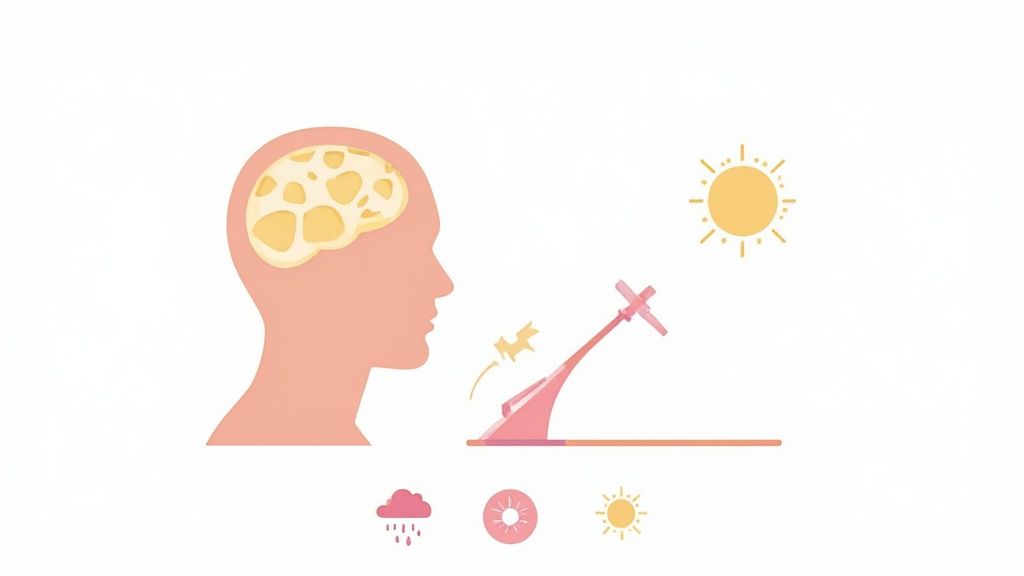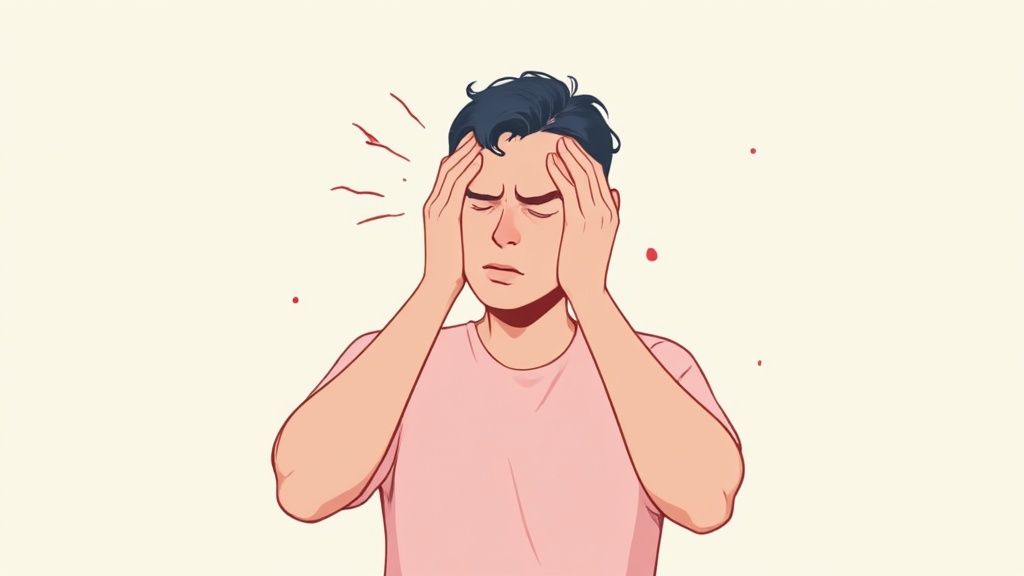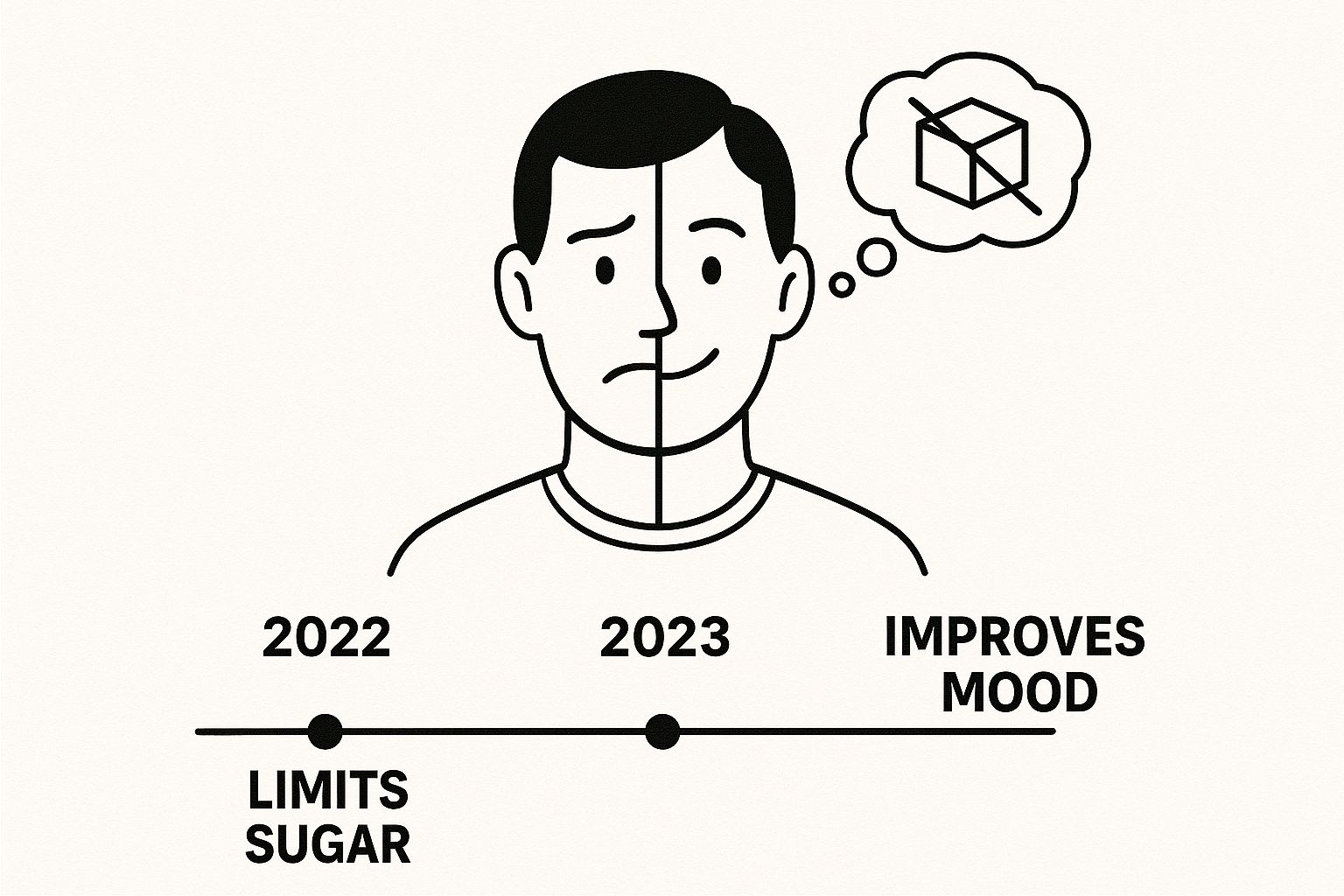Stop Eating Sugar Side Effects What to Expect

So, you’ve decided to cut ties with sugar. That’s a fantastic first step. But be prepared: your body is about to go through a bit of a detox, and it might not be a walk in the park at first. Expect some initial side effects like headaches, brain fog, and some seriously intense cravings. Don't worry, though. These feelings are temporary and a clear sign your body is getting back on track.
What Happens When You Stop Eating Sugar

Let's get straight to it. When you quit sugar, your body has to learn to live without it. Think of it this way: your brain has been running on a cheap, high-octane fuel for years. When you suddenly switch to a cleaner, more sustainable energy source, the engine is going to sputter for a bit while it adjusts.
That initial turbulence is all about brain chemistry. Eating sugar triggers a flood of dopamine, the brain's "feel-good" chemical, creating a powerful reward sensation. It’s a shortcut to pleasure, and your brain gets used to it—fast.
The Dopamine Disruption
When you suddenly take sugar away, you're pulling the plug on that well-established reward circuit. Your brain, now accustomed to those easy dopamine spikes, goes into a state of shock. This is what brings on those classic withdrawal symptoms.
Many people report a whole host of unpleasant feelings:
- Physical symptoms: Headaches, fatigue, and even light-headedness.
- Mental symptoms: Brain fog, irritability, and anxiety.
- Intense Cravings: An almost overwhelming urge to eat something sweet.
This isn't a sign of weakness; it's a completely normal physiological reaction. As these dietary sugar statistics show, sugar has a powerful hold on our biology. Your body is simply recalibrating, learning to find balance without the constant hit of processed sugar.
The discomfort you feel at the beginning is actually a good thing. It means your body is actively fighting to break its dependency and rewire itself for a healthier, more stable future.
Knowing what to expect makes the process much easier to handle. Instead of being discouraged by the side effects, you can see them for what they are: temporary hurdles on your way to long-term health.
To give you a clearer picture, here’s a quick rundown of the most common physical and mental symptoms you might encounter.
Common Sugar Withdrawal Symptoms at a Glance
| Symptom Category | Common Side Effects |
|---|---|
| Physical | Headaches, Fatigue, Nausea, Dizziness, Muscle Aches |
| Psychological | Irritability, Anxiety, Depression, Brain Fog, Difficulty Concentrating |
| Cravings | Intense urges for sugary foods and drinks, Cravings for other carbohydrates |
Remember, everyone's experience is different, but recognizing these symptoms can help you prepare and manage them effectively as your body adjusts.
Your Sugar Withdrawal Timeline
Knowing what to expect when you quit sugar can make the whole process feel a lot less intimidating. Think of it less like a random storm of symptoms and more like a predictable path. When you have a roadmap, you feel prepared and in control, rather than blindsided by the changes your body is going through.
This visual really captures the journey—from the initial struggle to the eventual feeling of freedom.

The split face tells the story perfectly. You'll go through some initial discomfort, but it eventually gives way to a much brighter, healthier state once your body fully adjusts.
The First Few Days (Days 1-3)
Let's be honest: the first 72 hours are usually the toughest. This is the period when your body and brain sound the alarm, realizing their usual, easy fuel source is suddenly gone. This is where the most intense side effects of quitting sugar tend to hit.
You can probably count on:
- Intense Cravings: Your brain is practically begging for its usual dopamine hit from sugar.
- Headaches: This is a classic withdrawal symptom as your body scrambles to adjust to new energy sources and fluctuating blood sugar levels.
- Brain Fog: Feeling fuzzy, unfocused, or just slow is completely normal.
The Rest of The First Week (Days 4-7)
Once you push past that three-day mark, the initial shock starts to wear off, but you're not quite out of the woods. This is when moodiness, irritability, and pure exhaustion can really set in. You might feel totally drained and emotionally fragile as your body works overtime to recalibrate.
This is a critical time. It's the point where many people feel tempted to throw in the towel. Remind yourself that this fatigue is a sign of healing—your body is working hard to repair itself.
By the end of this week, you’re over the biggest hump. If you want a more detailed breakdown of what to expect, check out our guide on sugar withdrawal symptoms.
Beyond The First Week
After the first seven days, things really start to look up. You might still have a random craving or a moody moment, but your energy will begin to steady out. As you head into the second week and beyond, many people report feeling a newfound mental clarity, sleeping better, and enjoying a genuine sense of well-being.
Here is the rewritten section, designed to sound natural and human-written.
Why Your Brain Fights You with Intense Cravings
Have you ever wondered why trying to quit sugar feels less like a diet change and more like an all-out war with your own brain? It’s not just you, and it’s definitely not a sign of weak willpower. The intense cravings you feel are one of the most common stop eating sugar side effects, and they’re rooted in cold, hard brain chemistry.
For years, you've been carving out a pathway in your brain—think of it as a well-worn superhighway built just for sugar. Every time you ate a sweet treat, a rush of dopamine (the "feel-good" chemical) shot down that highway, signaling pleasure and reward. Your brain, being incredibly efficient, learned to love this direct route to a good feeling.
The Dopamine Reward Loop
This process creates a powerful cycle that’s tough to break. Your brain essentially learns a very simple equation: "Sugar = Pleasure. Let's do that again!" Repeat that enough times, and what started as a simple preference becomes a deeply ingrained habit. So when you suddenly cut off the sugar, that highway doesn't just disappear. Your brain keeps trying to send traffic down it, wondering where its expected reward is.
That overwhelming pull you feel isn't just a fleeting thought; it's a genuine biological signal. Your brain is actively demanding the reward it has grown accustomed to.
The craving isn't just a mental game. It's a physical signal from a brain that's missing its usual chemical hit. Knowing this can help you take a step back and observe the feeling instead of being controlled by it.
How Habits and Stress Fuel the Fire
It’s not just brain chemistry, either. Our daily routines and emotions are deeply tied to our cravings. Think of these triggers as the on-ramps that lead directly back to that sugar superhighway.
You might be surprised by what triggers you. Common ones include:
- Habitual Cues: Do you always reach for a biscuit with your 3 PM coffee? Before you know it, the coffee itself becomes the trigger.
- Emotional Responses: Stress, boredom, and sadness are huge culprits. Your brain knows sugar offers a quick, reliable comfort, so it sends out a craving when you're feeling low.
- Environmental Factors: Sometimes, it's as simple as walking past a donut shop or seeing an ice cream commercial. These external cues can ignite a powerful craving out of nowhere.
Learning to spot these triggers is the first real step. Once you know what they are, you can start building detours and finally break free from the cycle for good.
How to Handle the Physical Side Effects
It's not just the cravings. When you quit sugar, your body has a lot to say about it, and it isn't always pleasant. You might be dealing with headaches, feeling completely drained, or having some digestive issues. These are classic sugar detox side effects, but don't worry, they're manageable.
The trick isn't to just grit your teeth and push through it. It's about understanding why you feel this way so you can give your body the support it needs to adjust. Think of it like helping a friend through a tough time – you need to be gentle and supportive.
Combatting Headaches and Fatigue
That pounding headache? It’s often your body's direct response to your blood sugar going on a rollercoaster ride. Your system is used to getting quick, easy energy from sugar. Take that away, and it has to learn how to burn more stable fuels like fat and protein, which is a big adjustment.
Here’s how to fight back and get some relief:
- Hydrate, Hydrate, Hydrate: Seriously, water is your new best friend. Dehydration is a major trigger for withdrawal headaches, so keep a water bottle glued to your hand and sip on it all day long.
- Get Moving (Even a Little): I know, when you're exhausted, the couch sounds way better than a walk. But some light movement, even just a 10-minute stroll or some gentle stretching, gets your blood flowing and releases endorphins. It's a natural energy boost without the eventual crash.
- Lean on Protein and Healthy Fats: When you feel that energy dip, your instinct might be to grab carbs. Instead, reach for something that will stabilize your blood sugar. A handful of almonds, a hard-boiled egg, or a few slices of avocado will give you steady, lasting energy.
Remember: These physical symptoms are temporary. They're actually a good sign. It means your body is rewiring itself for cleaner, more stable energy in the long run.
Soothing Digestive Discomfort
You might also notice your gut feels a bit... off. This is totally normal. Sugar tends to feed the "bad" bacteria in your gut. When you cut off their food supply, your entire digestive system has to rebalance itself. This can lead to some temporary bloating or changes in your bathroom habits.
The best way to help your gut through this transition is to slowly introduce more fiber-rich foods. Things like leafy greens, chia seeds, and berries will help nourish the good bacteria and keep your digestive system running smoothly. It's a simple change that makes a world of difference.
Managing the Emotional Rollercoaster of Quitting Sugar

While the physical side effects of quitting sugar get most of the spotlight, the emotional journey can feel just as intense, if not more so. If you're suddenly feeling irritable, anxious, or just plain down, you’re not alone. Welcome to the "sugar blues"—a very real psychological response to cutting out the sweet stuff.
This isn’t just in your head; it’s a direct result of your brain and body chemistry trying to find a new normal. Think of it like this: for years, sugar has been the thing that gives you a quick mood lift. Your brain got used to that easy dopamine hit. When you take it away, your brain has to relearn how to produce those feel-good chemicals on its own, and that transition can be a little bumpy.
The irritability and mood swings aren't a sign that you're failing. They're actually a signal that your body is healing. Your hormones, like insulin and cortisol, are finally recalibrating after being on a chaotic sugar-fueled ride for years.
Finding Balance Without Food
The trick is to find new ways to soothe yourself that don't involve food. It's all about building a new toolkit of healthy coping mechanisms to help you ride out these emotional waves. The great news is that these strategies are simple, effective, and will help you build lasting mental strength long after the sugar withdrawal is over.
Here are a few practices you can try right away:
- Mindful Breathing: When you feel that wave of anxiety or irritation creeping in, just stop. Take five slow, deep breaths. This simple act tells your nervous system it's okay to calm down, pulling you back from the edge.
- Prioritize Sleep: Everything feels ten times harder when you're tired. A lack of sleep can seriously amplify mood swings. Aim for a solid 7-9 hours a night to give your body and brain the time they desperately need to repair and rebalance.
- Gentle Movement: You don't need an intense workout. A quick walk around the block or a few minutes of light stretching can release endorphins—your body’s natural mood-boosters—giving you a genuine lift without the eventual crash.
Getting a handle on the emotional side of this process is a huge part of your success. It all starts with understanding what’s really driving those urges. For a more detailed look, check out our guide on how to quit sugar cravings for more strategies to help you stay the course.
Frequently Asked Questions About Quitting Sugar
Thinking about breaking up with sugar? It’s a big step, and you probably have a ton of questions. Knowing what's coming can make all the difference, turning a daunting challenge into a manageable one.
Let's walk through some of the most common questions people ask when they're getting ready to ditch sugar. This will help clear things up so you can feel confident and prepared for the journey ahead.
How Long Do Sugar Withdrawal Side Effects Last?
This is the big one, right? The honest answer is that it really depends on how much sugar was in your diet to begin with.
You can expect the toughest part—those intense physical and mental cravings, headaches, and fatigue—to hit hardest in the first 2-3 days. For most folks, this acute phase smooths out within one to two weeks.
But the process doesn't end there. It's totally normal for milder symptoms, like the occasional craving or a bit of moodiness, to linger for a month or more as your brain and body fully adjust. The great news? Most people say they feel a major boost in energy and clarity after those first 10 days.
Will I Lose Weight Right Away When I Stop Eating Sugar?
Many people do, but maybe not in the way you expect. You might notice the scale drop quickly in the first week, but that's mostly your body letting go of excess water. Sugar causes inflammation and water retention, so cutting it out can give you a rapid "de-puffing" effect.
True, sustainable weight loss is a longer game. It comes from consistently ditching empty calories and improving your body's ability to burn fuel efficiently. The real win isn't just a number on the scale; it's building a healthier foundation that lasts.
Is It Better to Quit Sugar Cold Turkey or Gradually?
There's no single best way—it's all about what works for you. Both methods have their upsides and downsides.
- Going Cold Turkey: This all-in approach usually means you'll face a few days of intense withdrawal symptoms, but you'll get through them faster. It’s a great fit if you're the kind of person who does better with clear, black-and-white rules.
- Tapering Off Gradually: This method involves slowly cutting back, which makes the side effects much milder and more manageable. You could start by swapping sugary sodas for water, then move on to desserts, and finally tackle hidden sugars in things like sauces and dressings. This can feel less shocking to the system and more sustainable for some.
What Are the Best Healthy Swaps for Sugar Cravings?
When a craving strikes, having a plan is your best defense. The trick is to give your brain the sweet taste it wants without sending your blood sugar on a roller coaster.
Instead of grabbing a cookie or candy, have one of these on hand:
- A handful of fresh berries or a crisp apple with a spoonful of nut butter
- A square or two of high-quality dark chocolate (70% cocoa or higher)
- A small bowl of full-fat Greek yogurt with a dash of cinnamon
- A warm, comforting mug of naturally sweet herbal tea, like peppermint or licorice root
These swaps do more than just taste good. They also deliver fiber, protein, and healthy fats, which help keep your blood sugar stable and leave you feeling satisfied.